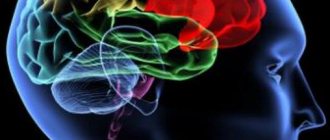Intuition
The ancient Greek thinker Socrates believed that his ideas were dictated to him by a personal demon called Daimonium (inner voice). Most people do not use the storehouse of knowledge about the world that lies within them - intuition. Its existence has been proven by researchers. In the main directions of personal development, methods have long been developed that allow optimal work with this precious tool.
Neurolinguist and professor at St. Petersburg State University Tatyana Chernigovskaya, based on recent research, makes quite interesting conclusions about the functioning of the brain and intuition. Here are some of them.
- The human brain is a mysterious thing that people mistakenly call “mine.” Who belongs to whom is a separate issue;
- Successful solutions from the unconscious “I” - intuition - come only if a person has already worked on a problem for a long time, but has not been able to find a solution using logic. A scientific discovery or creative idea cannot come by invitation. His maid did not dream of the periodic table. The scientist worked on his “brainchild” for a long time until something “clicked” in his brain;
- You definitely need to force your brain to work. The more the brain works, the longer it remains intact. Bekhterev’s granddaughter Natalya Bekhtereva spoke about this in her work “The Smart Live Long”;
- The brain makes a decision half a minute before a person realizes it. 30 seconds is a huge time interval for nervous activity. In the end, Chernigovskaya asks, who owns the decision made – the person or the brain?
Diverse personal development will be incomplete without a developed “sixth sense.” You can use different methods to develop your intuition. Effective methods are various self-knowledge techniques and meditation. They help clear the mind of information “garbage”. By practicing meditation, it is easier to listen to your inner voice.
You can also use the power of your brain while you sleep. As you fall asleep, think briefly about questions or problems that need solving. This is how the imagination is activated. While the conscious mind rests, the unconscious mind will search for a creative solution. Keep a notepad and pen nearby. If you wake up in the middle of the night with interesting ideas, you can immediately write them down.
The advantages of such a personality
- People who follow their interests can look at problems from different angles, choosing the most effective or creative way to solve them.
- Thinking is not limited, which is why they get much more out of life than those people who do not strive to develop and learn something new.
- Low incidence of depression. Every day is full, energy has an outlet, and new experiences allow you to experience a whole range of positive emotions. Where's the depression? And there’s not much time for it, because there are so many pleasures around, so much more to explore.
- Various types of tasks are completed more efficiently and quickly, if only because they have a lot of ideas and a desire to experiment and act.
- Self-esteem increases, since a person can easily rely on his knowledge, he understands what he can do, what he is able to give to another person and, in general, what he is capable of. Every small achievement, grain by grain, increases self-confidence.
- A versatile person is in demand both in professional activities and in personal life. He is interesting to others, his presence is welcome and valuable.
- The level of intelligence increases, memory, attention, logic, creativity, etc. improve. Roughly speaking, there is a harmonious development of the cognitive sphere.
- Material well-being. The financial situation is improving due to the competitive struggle of companies for valuable employees.
- There is an awareness of your values, aspirations, goals, feelings and boundaries.
- The level of morality is growing, which has a beneficial effect on society as a whole.
- Such individuals are less likely to be deceived, as they know how to recognize manipulation and lies.
- A high level of adaptability, that is, few adversities and problems can “break” them, because they know that there is always a way out, as long as there is life.
- The word “boring” completely disappears from the lexicon, because such people know how to appreciate every minute of their time and do not waste time.
Milton's patient and automatic writing
But there have long been assumptions in science that intuition is not fiction. There is an interesting case in the psychological practice of the world famous hypnotist Milton Erickson. It clearly hints at what information intuition may have about us, and is associated with automatic writing. Automatic, or trance, writing is a procedure during which a person writes without the active participation of consciousness. That is, he holds a pen or pencil in his hands, but is in a hypnotic state.
During one of his lectures, Milton Erickson demonstrated this method with the participation of a girl named Peggy. While under hypnosis, she wrote down a note on a piece of paper. Peggy then folded it several times and hid it in the pocket of her bag.
A few months later, the famous hypnotist received a phone call from her. “I found a note in my bag. Where did she come from? I assume that its presence is connected with you.” “What does it say?” asked Milton Erickson. “Will I have a wedding with Harold?” Peggy answered. “Please tell me, at the time of your visit to my lecture in April, did you know Harold?” “No,” the girl answered, “I was engaged to Bill. And nothing hinted at our separation. I recognized Harold in June, and before that I had only seen him a few times.”
Obviously, for several months the girl’s subconscious had information about her future relationships. Since consciousness could not yet accept this information, during hypnotic immersion she hid the note in a deep pocket.
How many times can you become a professional?
Calculations:
Malcolm Gladwell described the 10,000 hour law, loosely interpreted:
- To become a professional you need 2000+ hours (a year of 40 hours a week).
- To become a high-level professional you need 6000+ hours.
- To become a world-class expert – 10,000 hours.
Even if you want, you can become a programmer in 1000 hours (six months, 40 hours a week).
A university student spends 5,000 hours over 5 years. Half of the subjects are specialized. In 2500 hours, a “professional” is trained. Often - a professional slacker.
Let's take a 22-year-old student who graduated and realized that no one needs him. The student walks a lot, but learns quickly.
He has 2 options: whine or study. A smart student chooses to study.
What can we achieve by age 60?:
- Master 20-30 professions.
- Or become a high-level professional in 10 professions.
- Or become a world-class expert - in 2 areas.
This is an ideal option, but even if you divide everything by 2, it’s still an excellent result. The only question is a person’s desire, time and energy.
The most advanced device: the human brain
What influences the development of a person’s personality the most? Of course, developed intelligence, the responsibility for which is our brain. The part of the brain that strictly corresponds to intelligence is called the neocortex - the cerebral cortex. It is filled with neurons - nerve cells. They are so densely packed that the average neocortex contains about 30 billion nerve cells. If you draw a small square on paper, the side of which is equal to 1 mm, then a hundred thousand nerve cells will fit in it.
These 30 billion neurons are the human personality. In fact, the main directions of personality development work precisely with this microscopic area. Almost all the skills, abilities, and memories are contained here. As for the brain as a whole, the already mentioned Tatyana Chernigovskaya gives the following comparison regarding its “capacity”. It holds 5.5 petabytes of information. It's like watching a video series for 3 million hours without interruption - it would take three hundred years.
Another phenomenon is the division of the brain into two hemispheres. Left hemisphere thinking is logical and systematized. It is activated during the processes of counting, reading, writing, and collecting individual facts. The right hemisphere works on a completely different principle. It thinks in images - it “recognizes” faces, places, melodies.
About a century ago, humanity had no idea what diversified personality development was. The concepts of the functions of the right and left hemispheres arose in the mid-twentieth century. But they provide an opportunity to learn some obvious principles. Example: Children are often scolded for sitting in front of television screens instead of reading books. And, apparently, for good reason. Watching TV or hanging out on the Internet really comes at the expense of personality development.
Television carries a huge flow of visual information, perceived by the right hemisphere. But processing and understanding it with the left hemisphere requires time and skills that the child does not possess. Through reading, children develop the ability to think abstractly. Television, with its constantly changing pictures, does not provide such an opportunity. Diversified personality development, especially in childhood, occurs only when both hemispheres are used.
Problems of raising a comprehensively developed personality
Theoretical and practical problems put forward by life in the course of implementing the idea of comprehensive personal development
In “Philosophical Notebooks,” taking notes from L. Feuerbach’s book “Lectures on the Essence of Religion,” V.I. Lenin wrote: “Man needs an ideal, but a human one, corresponding to nature, and not a supernatural one.” What follows is a quote from Feuerbach: “Let our ideal not be a castrated, disembodied, abstract being, but a whole, real, comprehensive, perfect, educated person.”1 Striving for an ideal in the practice of educational work, the ability to see this ideal in a living human embodiment is not such a simple thing as it seems at first glance. One of the conditions on which mastery and perfection of educational work depends is the teacher’s ability to focus on a living ideal, the ability to see, appreciate, and cherish the most important, defining thing in a person. The process of educating a comprehensively developed, harmonious personality is that, while caring for the perfection of every facet, side, trait of a person, the educator at the same time never loses sight of the fact that the harmony of all human facets, sides, traits is determined by something leading, fundamental. Living human flesh and blood of a comprehensively developed person embodies the fullness and harmony of forces, abilities, passions, needs, in which the educator sees such aspects, features, facets as moral, ideological, civil, mental, creative, labor, aesthetic, emotional, physical perfection. The leading, determining component in this harmony is morality. School is a center of knowledge, education, mental culture and work; for years the teacher leads his students along the path of knowledge to the heights of human wisdom; intellectual values and mental work are the most important tools in our hands, with the help of which we create a person.
V. A. Sukhomlinsky
However, the nature of the human spirit is such that not all students who come to school as small children leave its walls for life equally spiritually rich, equally connected to an inexhaustible source of intellectual values. For some, secondary education is only the first step on the path to further intellectual enrichment, knowledge, and improvement, while others master the secondary school curriculum with great difficulty and tension, but this does not mean that such a person is unhappy and doomed.
The inequality of mental abilities, which becomes obvious to the pupils themselves already in their childhood and adolescence, understanding
This inequality as the reason why not everyone is destined to reach the same limit of mental development - this circumstance becomes in our days the source of a number of difficulties and a number of extremely important, subtle, complex problems of the idea of comprehensive development. The teacher’s task is to ensure that this inequality is not experienced by individual students as misfortune. Unfortunately, in the practice of educational work of some schools, it is precisely the understanding of individual children of their limited capabilities in intellectual development that is the reason for their reluctance to learn. Already in childhood, a person feels as if inferior. This shouldn't happen! Every person, already in childhood and especially in adolescence and early youth, must comprehend the happiness of the fullness of his spiritual life, the joy of work and creativity.
This is a very subtle, one might say, delicate problem of the process of educating a comprehensively developed personality. Its practical solution lies precisely in ensuring that the spiritual life of the school and its students is not limited and not exhausted solely by success in mastering the curriculum. The skill and art of educating a comprehensively developed personality lies in the teacher’s ability to open to literally everyone, even to the most ordinary, most intellectually difficult pet, those areas of development of his spirit where he can reach the pinnacle, express himself, declare his Self, draw strength from source of human dignity, to feel not deprived, but spiritually rich.
This area is moral development. Here the road to the top is not closed to any person, here there is genuine and boundless equality, here everyone can be great and unique. The idea of comprehensive development can be fully realized only on the condition that communist morality permeates all facets of the human personality, opening up for everyone the path to civic, ideological, creative, labor, aesthetic and intellectual values...
Personal harmony, which seems to us the ideal of comprehensive development, cannot be achieved without harmonious educational work. Studying, lessons, completing assignments, constantly receiving grades should in no case become the only and all-absorbing yardstick by which a person is measured and evaluated - and he, a little person, perceives and experiences this assessment, this everyday measurement with particular acuteness and vulnerability. He must see from his own experience that he is measured by many measures, approached from different sides. A person who comes to our school as a small child should not be a student in the narrow sense of the word. If for a teacher he is only a creature to whom knowledge must be given, put into his head, he will not become a comprehensively developed personality. Personality is unthinkable if a person does not declare himself, if in some sphere of the human spirit he has not become a ruler, if he does not assert himself in activity and - this is extremely important - in successes, if he does not experience his dignity as a creator, if he does not go with your head held high. Harmonious education is to ensure that the moral wealth of the multifaceted activity of the person we are educating is superimposed on all spheres of the spiritual life of the school...
Second
The problem that is determined in the course of implementing the idea of comprehensive development with all the complications and difficulties that arise from it is that
the entrance to that palace, whose name is
knowledge
so that the younger generation will value this blessing as an invaluable achievement of our revolution.
It seems paradoxical, simply incomprehensible to the mind, that for some part of teenagers and youth this great blessing is a burden, teaching is a heavy burden, and teachers in some cases have to endlessly fight with quitters and slackers... This can only be overcome if if the core of the spiritual life of the school, the focus of the richness and versatility of the relationship of the individual to the environment, which was discussed, becomes obligation.
Our time has opened up new dimensions in the most important moral problem, which is at the same time the problem of the comprehensive development of the individual.
This is a relationship, a combination of public and personal, harmony of personal happiness and public good. The ability to obey public duty must correspond to a person’s personal desires. This is an obligation. Moral consumerism is a huge vice that sometimes penetrates into the world of childhood, adolescence and early youth in our country due to the fact that due to the wrong, it would not be an exaggeration to say, unreasonable approach of elders to younger ones, the younger ones have a distorted idea of what elders should in relation to them, the younger ones, and what they, the younger ones, owe in relation to the elders, to society. Harmonious development of personality is possible only if from an early age a person is convinced from his own experience: in life there is a difficult concept,
there is a great strain of physical and spiritual forces, there is permissible and unacceptable, commendable and reprehensible, morally noble and vile. Comprehension of the difficult opens up the path to happiness for a person - this is the skill and art of education in the spirit of duty... The task of the educator is to make it difficult for his pet; It is in the comprehension of the difficult that the origins of the ability, the deeply moral ability, are to appreciate the material and spiritual wealth that is given by older generations. Comprehension of the difficult as a source of happiness and joy of the individual is revealed where there is strict harmony between what a person receives from society and what he gives to society.
Here we come to the third
the problem of comprehensive personal development -
nurturing needs.
The task is not only to cultivate diverse material and spiritual needs.
Consumption is not that difficult. It is much more difficult to achieve the harmonious development of material and spiritual needs, and especially to ensure that in a person’s life there is active activity, the purpose of which is the formation and satisfaction of needs of a higher order - the needs of the spirit. Material benefits have now poured into the world of childhood, adolescence and early youth in such an abundant flow that there is a danger of losing the idea of labor origin and, in general, the source of these benefits. One of the very difficult socio-pedagogical problems now is to ensure that children, adolescents and young people are brought up, one might say, with a strict attitude towards material wealth. In cultivating such an attitude, we see great wisdom and moral wealth of mentors - father, mother, teacher. What is especially important here is that life acquires a pronounced moral meaning. In the minds of a young citizen, we develop the thought and feeling that this is what I have the right to want, but this I have no right to want; this is reprehensible, unacceptable, shameful for me. Nurturing a culture
of desires -
one of the brightest shades of that complex thing that we call the moral meaning of school life. Only a person who knows how to desire humanly understands and feels what is difficult, what is permissible and what is impermissible. The culture of desire is the other side of must. By cultivating highly moral, noble desires and restraining from unacceptable and impermissible desires, we thereby prevent a great misfortune - the corrupting, corrupting influence of satisfying whims.
The cultivation of a culture of desires is largely determined by the extent to which a wise harmony is established in a person’s life between the satisfaction of material needs and the formation, development, and satisfaction of spiritual needs.
This is
the fourth,
equally complex and difficult, problem of comprehensive personal development. A school as a center of high morality and culture is unthinkable without the rich, multifaceted spiritual life of the collective; personality - if we have as our ideal, according to A.V. Lunacharsky, a clearly expressed personality (and this is exactly how the ideal of education should be represented) - is unthinkable without the richness of spiritual life.
One of the paradoxes that, unfortunately, we sometimes have to face is that there is teaching and mastery of knowledge, but spiritual life is essentially absent. Now that we are implementing universal secondary education, the problem of the spiritual life of the school community and the individual is acquiring exceptional importance. If the world of intellectual interests of the person we call a schoolchild is limited to preparing lessons, if there is nothing besides mandatory knowledge, if the sphere of intellectual life is squeezed only into learning and does not include creative work - school becomes a very unattractive, gloomy place for a person, and teaching is a difficult, boring, monotonous task. Only when a multifaceted spiritual life is in full swing at school does the acquisition of knowledge become a desirable, attractive endeavor; it does not stop even after graduation and continues during the years of labor...
The universality of secondary education and the accessibility of higher education to millions of workers and peasants are phenomena unprecedented in the history of mankind, the source of which is justice and the humanity of the socialist system. In an exploitative society, acquiring knowledge and obtaining a diploma meant the right to certain privileges that were not available to the mass of workers, and above all, the privilege of being freed from labor. Education and work in the sphere of material production were incompatible. Our society has set a goal to introduce all workers to cultural values and riches. The function of education has completely changed. Knowledge is needed not only for work, but also for a rich, versatile, happy spiritual life that is not directly related to work. This educational orientation of the comprehensive school puts forward the fifth
the problem of the idea of comprehensive development:
a person receiving secondary education must be prepared, “set up” for the “simple”, “rough”, everyday work of a worker and peasant.
It is necessary to cultivate not just a readiness - practical and moral - for this work, but also an aspiration, a desire, an inclination to devote one’s entire life to it. This problem is one of the most difficult, it is closely related to the previous ones.
Assimilation of lasting, deep, meaningful knowledge, nurturing for life an ineradicable human desire to know more than I know today -
This is
the sixth
problem of the idea of comprehensive development. We did not put it in first place only because, like other problems of comprehensive development, it is connected with many other problems by thousands of threads-dependencies, depends on them and at the same time determines their successful solution. In raising a comprehensively developed person, there is nothing secondary at all, everything here is important, and if anything is missed or done incorrectly, the foundations of harmony, which represents comprehensive development as a single whole, are destroyed...
Without a sensitive, careful attitude of the teacher to the honor and dignity of the little worker, whom we call a student, a schoolchild, neither a sense of duty nor obedience is unthinkable - and these things are as inseparable from school education as love for a child. The most sophisticated “creativity” of the teacher, the goal of which is to achieve discipline, obedience, and responsibility in pupils, remains powerless and, moreover, leads to conflicts between the teacher and his students, if, figuratively speaking, honor and dignity do not give birth to a baby - the desire to learn... Only if you If you know how to nurse this child, obedience, discipline, responsibility, and duty become subtle, wise instruments in your hands.
High pedagogical family culture
- this is
the seventh
problem put forward by life in connection with the implementation of the idea of all-round development of man. Improving and deepening the social character of education does not mean diminishing, but strengthening the role of the family. Harmonious, all-round development is possible only where two educators - school and family - not only act together, setting the same demands for children, but are also like-minded, share the same beliefs, always proceed from the same principles, and never allow any differences. in the purposes, neither in the process, nor in the means of education.
This problem is also one of the most complex and difficult. The interdependence of pedagogical phenomena these days is becoming more and more complicated: the tasks put forward by life to the school are becoming so complex that without a high pedagogical culture of the entire society, and above all the family, the efforts of teachers, no matter how significant they may be, will not be effective enough. All school problems should find their refraction in the family, all difficulties arising in the complex process of school education have their roots in the family; The comprehensive development of the individual depends on the kind of people the mother and father reveal to the child, how human relationships and the social environment are learned through the example of parents.
A serious task of the family and school is to develop in pupils moral readiness for fatherhood and motherhood. Without this readiness it is impossible to imagine the comprehensive development of man. Readiness for the high mission of father and mother is one of the most important aspects of the citizenship of people in a socialist society. Many years of experience have convinced us that the ability to see the future father and mother in a child, teenager, young man, girl, the ability to evaluate pedagogical phenomena from the position that in two decades our child will bring his son to school and will think with us about how it is better to educate him - this skill is necessary for our society to the same extent as the high level of labor skill of producers of material and spiritual values. The first school of fatherhood and motherhood is full-fledged moral education in the years of childhood, adolescence, and early adolescence. The teacher, concerned that every child becomes a good father, sees a task of great educational importance in the establishment of an extremely valuable moral trait - active duty. Therefore, one of the defining conditions of moral education is the desire to ensure that each of our pets, already in childhood and early adolescence, is able to assume the work of responsibility, the burden of duty.
for life, health, peace of mind, well-being of other people; so that evasion of work, responsibility and duty is thought and experienced by a person as an abomination.
The first lesson of moral readiness for motherhood and fatherhood is, therefore, that already in the years of childhood and early adolescence, each of our pupils should be able to value man as the greatest value, be irreconcilable, intolerant of the very idea that one can bring misfortune to a person, insult, humiliate him. Genuine philanthropy presupposes high discipline of actions, feelings and thoughts. Our motto is that man is not a slave, but the master of his feelings and impulses.
Carrying out the task of instilling moral readiness for motherhood and fatherhood, we came to a system of ethical conversations dedicated to the high mission of mother and father. These are conversations about love and friendship, marriage,
childbearing, raising children. Of course, these conversations would be useless if it weren’t for the care of the teaching and parent teams to ensure that every child in the family and at school sees an example of conscious work
and
responsibility.
From the moment parents send their child to school, they become students of the parent school. The program for the continuous improvement of the pedagogical culture of fathers and mothers is, in essence, our joint work with them - subtle and difficult, the ultimate goal of which is the ideal of a comprehensively developed, harmonious person. The most difficult thing is that the father and mother, together with us, see and understand the spiritual world of their child, are able to understand the causes and consequences, and comprehend upbringing as purposeful work...
Adulthood should not come to a person unexpectedly. Where parents one day are amazed to realize that their children have become adults and that something needs to be done urgently, society ends up with 20-year-old babies who are mature enough to have children, but who are morally immature. Nurturing Moral Maturity
-
the eighth
problem of comprehensive development. School is a world of happy childhood, but this world should be illuminated by the thought that children will become adults tomorrow. Adult thoughts, worries, ideas - all this should gradually enter the world of serene childhood. Nurturing moral maturity is a complex process that affects all areas of the developing personality’s relationship with the natural and social environment, from relationships in the family to the fulfillment of civic duty. Moral maturity and adulthood are decisively determined by the attitude towards work, or more precisely, by the place of work in spiritual life. The degree of maturity depends on how a person lives, what worries and anxieties fill his life, what the meaning of life reveals to him. One of the most difficult pedagogical tasks is to ensure that the most important concern that fills a person’s spiritual life already in the years of early adolescence is a passion for work. Maturity is a spiritual focus on the future, the ability to think about what I will be like tomorrow. In the education of moral maturity, it is important that the work that spiritualizes the student has social significance.
A citizen begins with the conviction: with my work I fulfill my duty to people. Already at the age of 13-14, an important place in a person’s spiritual life should be occupied by labor activity that creates material values for people. It cannot be reduced to just reminding teenagers: you are first and foremost students, your main responsibility is to study well. If a Komsomol member feels like only a student, only being educated, he will become a carefree consumer, and from here it is one step to freeloading. The root of maturity, adulthood is that at the age of 13-14 a person sees in himself not only a student, but also a member of society who has responsibilities to people, without whose work (he must be convinced of this from his own experience) they could not other people live. This is the true connection between learning and work. It is inseparable from moral education and constitutes the very essence of the moral development of the individual.
Anthology of pedagogical thought of the Ukrainian SSR / Comp. N. P. Kalinichenko. - M., 1988. - P. 444-457.
How to develop intelligence?
Imagine a racing cyclist trying to ride using only first and second gear. He is sincerely surprised why he can't win the race. Most people are like this cyclist when it comes to harnessing the power of the brain. They don't even realize that their "thinking apparatus" has third and fourth speeds.
There are some people who use their brains a little more than others. And everyone immediately begins to consider them “gifted.” But in reality, they are simply using their brain reserves more optimally. For them, diversified personality development is the norm, and not a temporary burden on the brain. Let's look at several methods that allow you to use both brain hemispheres and develop intelligence.
- When solving problems, use analogies and look for similar processes in other areas of human knowledge;
- Use imagination: deliberately “turn off” the fundamental laws of nature, as it happens in fairy tales;
- Communicate with people of high intelligence - even if they do not belong to your professional circle. Personal development in an intellectual environment occurs much faster. This exchange of ideas is really interesting and involves a thought process. It is often useful for developing intelligence and solving problems related to a completely different area of knowledge.
- To solve practical problems, it is often useful to write a report, or depict the problem on paper. This method allows you to systematize existing issues and see them from the outside. This method is also applicable for self-knowledge - often a seemingly painful emotional problem loses its severity if you describe it with words or colors;
- You need to be able to ask yourself the right questions to change your perspective. Here you will have to strain your brain. For example, questions could be: “Could this object be larger or smaller?”, “Can something be added to it, or, conversely, taken away? Move? Should I place it higher or lower? Or questions of a different nature: “What if you look inside?”, “How else can this be used?”, “What difficulties does it eliminate and what does it create?”, “What is the principle of operation?” etc.
Is it true. We are all multi-potentials
What did Emily reveal to the world? She took the most ordinary healthy person and called him multipotential. She explained the topic well, but took one step to the side - that’s what I’m focusing on.
“Multipotentials” are not a special type of people; they were not born with an interest in everything. They just kept it!
Back to the childhood. Firefighters have not rushed to put out fires since childhood. Most likely, they stuck their hands into it and perhaps tried to lick it. They showed interest. If my mother slapped me on the wrist at such a moment as a child, I lost interest.
Firefighters have not rushed to put out fires since childhood. Most likely, they stuck their hands into it and perhaps tried to lick it. They showed interest. If my mother slapped me on the wrist at such a moment as a child, I lost interest.
Then the child tries to draw, and is told that the drawing is terrible. Minus potential interest.
Still maintaining an interest in sports, such a child goes to karate. A blow to the nose is the last interest “in the blood.” That's it, the future specialist is ready.
Initially, we were interested in everything. We are “multi-potentials.” But some were discouraged. From "multi" turned into "mono" . A well-rounded personality was turned into an ordinary person, or, in a good case, simply developed.
In “multipotentials,” the parents and environment turned out to be smart enough not to force the child into boundaries, and gave him the opportunity to develop his interests. Or, already in adulthood, a person was engaged in
Diversified personality development and sports
Does diversified personality development involve playing sports? Definitely yes. The world in which a person of the 21st century lives is radically different from the world of our parents. The pace of life has increased many times. The stress on the psyche has increased even more. Monotonous work and a sedentary lifestyle can lead to illness. And a low level of training leads to the fact that even a small psycho-emotional impact or the slightest physical activity has a stressful effect.
Both types of slight stress have the nature of training. But large and constant loads exhaust the body and psyche. Sports and physical activity allow you to achieve productivity in work and creativity, and avoid diseases. Sport is something that influences the development of a person’s personality in a direct way – through the body. You don't need expensive gym memberships to start working out. Squats and push-ups can be done right at home. How to make sports a part of your life? The method of physical activity can be different and selected taking into account the characteristics of the person and his wishes. But for classes to truly be beneficial, discipline is required.
If you are determined to include sports in your schedule, this may require double or even triple self-control. But diversified personality development is impossible without physical development. When planning classes, you need to take into account all factors: work schedule, family circumstances, studies. However, no circumstances can be an excuse. After all, everyone is responsible for their own physical condition.
In training you need to give 100%. Even the most sophisticated program will not succeed if it is executed poorly. It is during sports that endurance is tested. As professional athletes say, without extreme effort it is impossible to achieve extreme success.
Affected specialists
Emily's performance is brilliant, but she makes a substitution:
- A healthy, versatile person is multipotential.
- A child who was bullied in childhood and grew up as a specialist or worker is also healthy.
Emily focuses on multipotentialities and how they should be cherished. - Yes, they can handle it themselves!
The emphasis should be on the affected specialists! They can become creative, but they don't know that they can. They will remove fears and blocks - they will immediately sketch and sing.
Conclusion
Diverse personal development is possible only when a person’s unconscious aspirations are combined with conscious goals. Simply put, when intuition is friends with logic. Only a person with good self-esteem, balanced needs and motives, clearly defined goals and developed habits of self-control can count on achievements in various areas. Devoting time to the main areas of personal development also requires developed time management skills. These efforts are never in vain. A harmoniously developed person can avoid most disorders in the emotional, physical and moral areas.
Topics: Meditation, Mental health, Personal growth, Self-realization, Intellectual development









